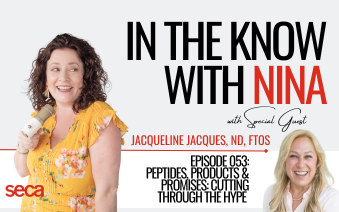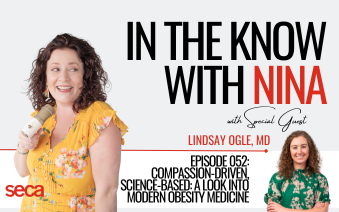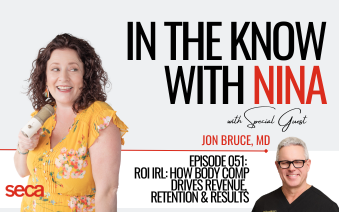Understanding Food Noise: A New Perspective on Hunger and Satiety
Written by Dr. Nina Crowley
I wanted to share some thoughts on a topic that has been on my mind recently—food noise. This term might be new to some of you, but for many people who struggle with intrusive thoughts about food and eating, it’s a constant battle. Food noise refers to those incessant, often overwhelming thoughts about food that can make it hard to focus on anything else. Understanding the neurobiological explanations for hunger and satiety, pleasure and reward is not only fascinating but crucial for advancing obesity treatments.
The Neurobiology of Hunger and Satiety
Lauren J. Young from Scientific American has done an excellent job of summarizing the neurobiological factors that influence our feelings of hunger and fullness. Read her article that sparked my interest, here.
These mechanisms involve complex interactions between hormones, brain regions, and neurotransmitters that regulate appetite and reward. One of the most interesting components of the current generation of medical treatments for obesity is their ability to suppress these intrusive thoughts about food, what we call the quieting of food noise. This is a welcome development for many who find their thoughts consumed by eating.
Challenging the Stigma of Obesity
I also want to highlight a comment by endocrinologist Dr. Daniel Drucker, whom I had the pleasure of seeing speak at the American Diabetes Association Scientific Sessions. He said, “For so long people who couldn’t lose weight and keep it off have been told that their willpower simply wasn’t strong enough. We—including healthcare professionals—would blame people challenged by their inability to lose weight. It’s hard to think of diseases where we blame the individual. You would never say, ‘Your cancer came back; you didn’t really try hard enough.’”
This perspective is vital in combating the stigma associated with obesity. The study of GLP-1s is particularly promising in this regard. By understanding the clear pathology behind obesity and addiction, we can replace harmful assumptions with scientific clarity. This shift not only helps those affected by these conditions but also educates healthcare professionals and the broader public about the true nature of these challenges.
Continuing the Conversation
For those interested in delving deeper into the topic of food noise and the neurobiological underpinnings of hunger and satiety, I highly recommend listening to Monica Reinagel’s Nutrition Diva Podcast, Episode 760, and James Hill & Holly Wyatt’s Weight Loss AND Podcast, Episode 24. These episodes offer valuable insights and discussions that complement the themes discussed here. When I think about food noise, I think about it in these domains: TIMING, CONTENT, INTENSITY, and IMPACT.
- TIMING: Thinking about food all the time and considered Relentless, Constant, pervasive, persistent, incessant, rumination and obsessive preoccupation
- CONTENT: You are thinking about what to eat next – typically tasty and tempting foods, foods you desire and foods you crave
- INTENSITY: Its not just a ‘ooh what should I take out for dinner’ these thoughts are difficult to suppress, excessive, and you are hyper-fixating on foods. This is where medication or surgery has impact, it takes the intensity down, not away – quieting the noise.
- IMPACT: The biggest part here is that these thoughts are UNWELCOME! They make it difficult to stick to plans, they contribute to overeating and maladaptive eating behaviors (which we often call emotional eating), and they are often associated with those living with obesity
Finally, the impact of reducing food noise is that people describe feeling FREE, what normal feels like to others, they don’t feel controlled anymore, they are able to stick to the logical plans they have, and have less anxiety about how others perceive them
As we continue to explore and understand the complexities of hunger, satiety, and food-related thoughts, it’s essential to approach the topic with empathy and scientific rigor. By doing so, we can support those struggling with these challenges and contribute to a more informed and compassionate healthcare environment.
Recommended Episodes
Episode 53: Peptides, Products & Promises: Cutting Through the Hype
Dr. Nina Crowley sits down with Dr. Jacqueline Jacques to explore peptides, GLP-1s, and the supplement surge in obesity care. They break down what’s science, what’s spin, and how clinicians can guide patients with evidence and empathy in a noisy marketplace.
Watch episodeEpisode 52: Compassion-Driven, Science-Based: A Look Into Modern Obesity Medicine
Dr. Lindsay Ogle joins Nina Crowley to explore a compassionate, virtual-first approach to obesity and metabolic care. They discuss the four pillars of treatment, the power of language, and why non-scale victories matter. Learn how Dr. Ogle is making care more accessible—and more effective—for patients across Missouri.
Watch episodeEpisode 51: ROI IRL: How Body Comp Drives Revenue, Retention & Results
In this episode, Dr. Jon Bruce shares how body composition analysis powers his wellness and aesthetics clinic. From preserving muscle to reducing visceral fat, his patients see measurable results—and his practice sees real ROI. Tune in for tips on business strategy, patient motivation, and clinical integration.
Watch episodeseca north america
Medical Measuring Systems and Scales since 1840
13601 Benson AvenueChino, CA 91710
USA
seca Service
As the world leader in medical scales, we also offer you first-class service. Together with our branches, partners and dealers, seca offers a worldwide service network that ensures our products work troublefree.
All rights reserved seca 2023


